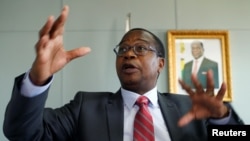By Reuters Staff
HARARE (Reuters) - Zimbabwe’s finance minister said on Monday the economy would not be as severely impacted by the COVID-19 pandemic as initially feared and foreign currency inflows had shown resilience.
The southern African nation was already grappling with runaway inflation, shortages of drugs in hospitals and strikes by public workers before the novel coronavirus arrived in March.
“I am more bullish again even during this COVID-19 moment, I think the economy will surprise us on the upside,” Finance minister Mthuli said during an online media conference.
“Our prognosis is that the impact of COVID-19 overall on Zimbabwe is not as deep as in other countries,” Ncube said but declined to give details or a new economic growth forecast.
Ncube had said during a mid-term budget statement in July that the economy was set to shrink by 4.5% this year owing to the fallout from the pandemic.
Ncube said the government had made significant progress on economic reforms, including cutting its wage bill from 92% of the total budget in 2017 to below 50% now and had stopped printing money and stabilised the exchange rate.
But ordinary Zimbabweans say life has become harder since Ncube was appointed to President Emmerson Mnangagwa’s cabinet two years ago with salaries lagging soaring inflation of 761% and prices of basic goods rocketing up.
Electricity tariffs rose 50% last week, which would feed into inflation, but Ncube said this was necessary to keep the state power company viable and enable it to pay coal suppliers.
Most teachers have refused to return to class since schools re-opened last week for the first time since March, saying they do not earn enough to work.
Ncube said mining and agriculture would anchor an economic recovery. The government would resume token payments to creditors like the World Bank and African Development Bank, which it owes more than $1 billion, Ncube said. (Reporting by MacDonald Dzirutwe; Editing by Toby Chopra)




